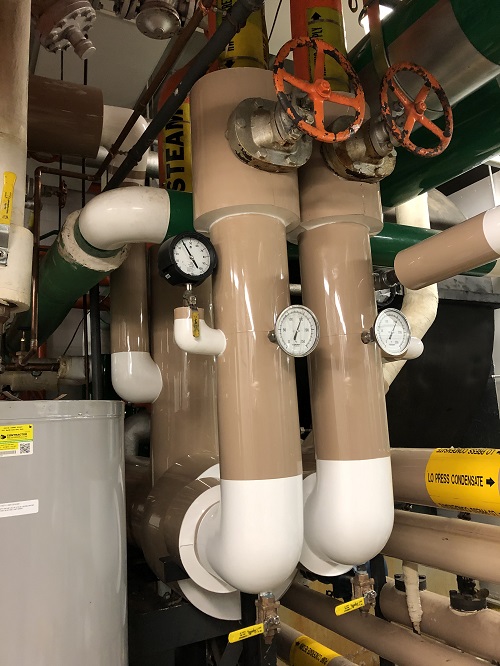Why It’s Critical to Inspect Your Industrial Insulation

When an expert contractor designs and installs your industrial insulation, it’ll help keep your facility safe and energy-efficient. And although insulation is often out of sight, it shouldn’t be out of mind—at minimum, a yearly inspection is crucial.
Insulation deteriorates over time. Without some care, it becomes ineffective, impacting personnel, processes, and the bottom line.
Follow along as we see why inspecting industrial insulation is vital and, above all, how to create a program to preserve your facility’s insulation effectiveness.
The Purpose of Industrial Insulation
Specialists design insulation to control energy flow, typically heat. Industrial insulation either prevents heat from escaping—or keeps heat from entering—a pipe, machine, tank, duct, boiler, chiller, valve, or vessel.
Insulation will shield workers from hot surfaces, help maintain constant process temperature, dampens noise, and more.
The benefits of industrial insulation include:
Reduced energy costs – Waste heat lost through inadequate insulation can add up significantly over weeks, months, and years. Proper insulation that blocks heat from escaping conserves energy and provides enormous value in the long run.
Improved quality and efficiency – Optimal temperatures support product throughput, especially in the multi-step procedures used in chemical manufacturing. Insulation ensures temperatures stay constant, aiding all processes that require a stable temperature.
Superior workplace safety – Employers are responsible for keeping workers safe, which includes protecting them from excessive heat, cold, and noise. Using insulation to shield dangerous surfaces or dampen noisy machinery is a simple and effective way to prevent workplace injuries.
Greater equipment longevity – Equipment tends to wear out more quickly than expected when it operates outside the design boundaries. Insulation that keeps temperatures stable prevents heat fluctuations that’ll weaken components.
Industrial Insulation Inspection & Maintenance
As time passes, insulation becomes less effective. A good maintenance plan begins with an inspection, which helps identify damaged, compromised, or missing insulation.
Without insulation inspection, problems are left unresolved with consequences that involve degraded safety protection for personnel, reduced process efficiency, accelerated corrosion, and increased energy usage.
According to the National Insulation Association, industrial insulation inspections should at least be carried out annually. However, a facility may require more than this—an experienced industrial insulation contractor can help you develop an inspection schedule with a scope, frequency, and priority of tasks that address your particular situation.
Proper insulation inspection consists of several elements:
External Visual Inspection
Simple to carry out, external inspection involves looking at a facility’s existing insulation with an eye for potential problems. In many cases, a glance can reveal minor concerns that, if unaddressed, could turn into big issues.
Insulation inspectors look for:
- Leaks or spills (may indicate where gaps or tears need repairing)
- Breaks or cracks in caulking that joins pieces of cladding
- Unsealed joints between insulation pieces
- Damage due to mechanical impacts or foot-traffic
- Abnormal condensation or frost on cold surfaces (low-temp operations)
- Unanticipated hot spots (high-temp operations)
- Improperly replaced or missing insulation
The external visual inspection will identify visible problems but cannot provide insight into conditions beneath industrial insulation. For that, you require a different type of inspection.
Internal Insulation Inspection
To examine the substrate below the surface of the insulation, inspectors often make use of inspection ports. Commonly fitted by the installation contractor to facilitate inspection, removing the plug from an inspection port permits a view of the insulation’s subsurface.
Although convenient, there are downsides to inspection ports. The plugs—and the ports themselves—may become damaged, leading to heat loss. Also, a port only exposes one location; an inspector might miss damage that exists just outside the viewing area.
Internal inspection can reveal corrosion under insulation (CUI), one of the most widespread consequences of improper insulation maintenance. Prevalent in many industries, such as onshore and offshore oil & gas, petrochemical, specialty chemical, and fertilizer, CUI occurs when moisture gets underneath the insulation. Internal inspection is critical to identifying CUI.
Some areas have conditions that are more susceptible to corrosion, so determining high-risk regions is vital for developing a program for industrial insulation inspection.
Risk Assessment
Some insulation issues have a bigger impact on operations than others. Carrying out a risk assessment allows you to prioritize inspection tasks and optimize scheduling. Many industrial insulation inspection programs have a spectrum of practices tailored for low-risk and high-risk areas of a facility.
The risk assessment identifies locations where failed insulation has the highest safety and operational consequences. Spend more time and effort inspecting these areas to balance your maintenance efforts with ongoing operations.
A skilled insulation contractor has the knowledge and experience to develop an industrial insulation inspection program that fits your facility and your budget.
Comprehensive Industrial Insulation Inspection Services
Inspecting your facility’s industrial insulation is critical for a productive and safe workplace. Use external and internal inspection in tandem with a risk assessment to prevent:
- Waste heat loss
- Unsafe work conditions
- Increased energy costs
- Decreased product quality
- Equipment deterioration
A knowledgeable insulation contractor is crucial for developing a successful industrial insulation inspection program. With over 20 years of experience installing, repairing, and inspecting insulation, MultiService Industrial can create a program tailored to your facility and budget.
Reach out to us today and find out how we work together to preserve your industrial insulation for years to come.